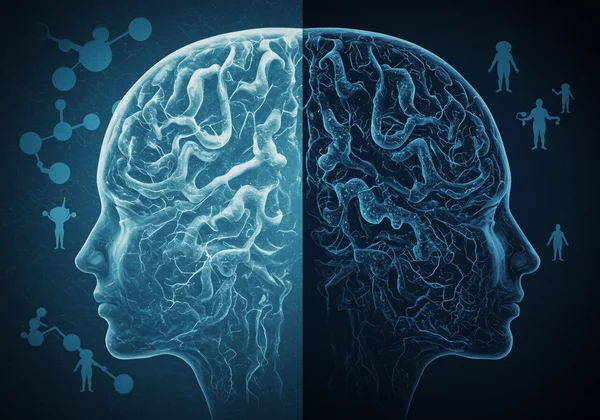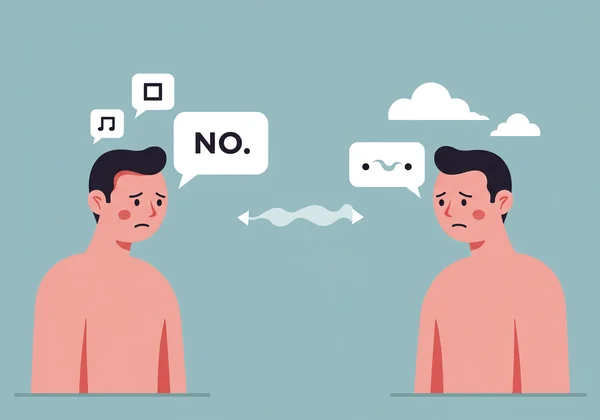Neurodivergent Traits in Adults: Beyond Your Aspie Quiz Score
September 7, 2025 | By Leo Sinclair
Have you ever felt like you're operating on a different wavelength from everyone else? Many adults navigate the world with a persistent feeling of being 'different,' wondering if their unique perspectives and experiences align with neurodivergent traits. The Aspie Quiz can be a powerful first step in this journey of self-discovery, but the score is just the beginning. What do my Aspie quiz scores mean in the context of real life? This guide will take you beyond the numbers to explore the diverse characteristics of neurodiversity and ASD in adults, helping you connect the dots of your own experience.
Understanding your traits is a journey toward self-acceptance and empowerment. It's about finding a language for your inner world. If you're ready to begin that exploration, you can start the quiz now or read on to gain a deeper understanding of what neurodiversity can look like in adulthood.
What are Neurodivergent Traits in Adults?
Neurodiversity is the concept that brain differences are natural variations in the human genome. For adults, identifying these traits often involves looking back on a lifetime of experiences and recognizing patterns. It’s not about a flaw or a deficit but a different way of processing information, interacting with the world, and experiencing life. These traits can influence everything from career choices to relationship dynamics.
This journey is about self-awareness, not labels. An online asperger's test can provide a structured framework to begin understanding these patterns. The goal is to gain insights that empower you to build a life that aligns with your authentic self.

Beyond Stereotypes: The Nuances of Adult ASD Presentation
Autism Spectrum Disorder (ASD) in adults often looks very different from the stereotypes portrayed in media. Many high-functioning adults develop sophisticated coping mechanisms that mask their underlying traits. Instead of obvious social difficulties, an adult might experience profound social exhaustion from constantly "performing" neurotypical behaviors.
Special interests, often seen as a core trait, may manifest not as an obsession with trains or numbers, but as a deep, academic, or professional passion. This can lead to incredible expertise and success in fields like IT, engineering, or art. The presentation is subtle, woven into the fabric of a person's life and personality.
Common Characteristics: How Traits Manifest in Daily Life
Neurodivergent traits appear in the small, everyday moments. It might be an unwavering need for a consistent morning routine or a strong preference for direct, literal communication that can be misinterpreted as bluntness. Many neurodivergent adults experience intense focus, allowing them to dive deep into complex problems for hours.
Other common characteristics include a unique sense of humor, a strong commitment to justice and fairness, and a logical, pattern-based approach to problem-solving. Conversely, challenges might arise with executive functions like planning long-term projects or transitioning between tasks. Recognizing how these traits manifest is key to understanding your personal strengths and challenges. A free aspie quiz can help identify which of these areas resonate most with you.
Understanding Autism Traits in Women & Undetected Adults
For decades, autism was considered a predominantly male condition. We now understand that it presents differently in women and other genders, leading to generations of undiagnosed individuals. Many women, in particular, learn to navigate social situations by observing and mimicking their peers from a young age, a process that can delay recognition of their neurodivergent traits for years, or even a lifetime.
These individuals often receive other diagnoses first, such as anxiety, depression, or BPD, because their internal struggles are more apparent than their outward autistic traits. The growing awareness of these different presentations is helping more adults find answers and community later in life.
Masking & Camouflaging: Why Diagnosis Can Be Delayed
Masking, or camouflaging, is the conscious or subconscious suppression of natural responses to fit in with neurotypical expectations. It's like running a constant social translation program in your head. This might involve forcing eye contact even when it's uncomfortable, scripting conversations in advance, or mimicking the gestures and facial expressions of others.
While an effective survival strategy, masking is mentally and emotionally draining. Ever feel completely wiped out after a simple coffee chat, even if it was enjoyable? That exhaustion is the hidden cost of masking. It can lead to burnout, anxiety, and a feeling of losing one's true identity. Many adults who seek a diagnosis do so because the energy required to maintain the mask has become unsustainable. An asperger's self-assessment can be a private first step to see what lies beneath the mask.

Internalized Experiences: Emotional & Cognitive Differences
For many undetected adults, the neurodivergent experience is largely internal. This can include intense emotional responses that are not always expressed outwardly, a tendency towards deep rumination and analysis, and a rich, complex inner world. It might also involve Alexithymia, a difficulty in identifying and describing one's own emotions.
Cognitively, many neurodivergent adults excel at pattern recognition and logical thinking but may struggle with tasks that require cognitive flexibility. This internal landscape is a critical part of the neurodivergent identity, yet it's often invisible to others. The optional AI autism report from our quiz is designed to provide deeper insights into these personal experiences.
Navigating Sensory Sensitivity in Neurodivergent Experiences
One of the most impactful traits is a different way of processing the physical world. The neurotypical brain is skilled at filtering out irrelevant sensory information—the hum of the refrigerator, the texture of a shirt tag, the brightness of fluorescent lights. Have you ever walked into a supermarket and felt your entire system just freeze from the lights, sounds, and smells all at once? For a neurodivergent individual, the brain's natural filter may be less effective, leading to a world that feels overwhelming and chaotic.
Understanding your unique sensory profile is fundamental to creating a comfortable and functional environment for yourself. It’s not about being "too sensitive"; it's about having a nervous system that is more finely tuned to its surroundings.
Hypersensitivity vs. Hyposensitivity: Understanding Your Unique Profile
Sensory experiences exist on a spectrum. Hypersensitivity means being over-responsive to stimuli. This can make loud sounds physically painful, certain textures unbearable, and strong smells nauseating. It’s why a crowded supermarket can feel like a full-blown assault on the senses.
On the other end is hyposensitivity, which is being under-responsive. An individual might not notice hot or cold temperatures, crave intensely flavored foods, or seek out deep pressure through tight hugs or weighted blankets. Many neurodivergent people experience a mix of both across different senses, creating a complex and unique sensory profile.
Strategies for Managing Sensory Overload & Seeking Comfort
The key to managing sensory sensitivity is accommodation, not endurance. This involves identifying your triggers and creating strategies to minimize them. Practical steps can make a world of difference:
- Noise-canceling headphones to block out overwhelming sounds.
- Wearing sunglasses indoors to reduce harsh lighting.
- Choosing soft, seamless clothing to avoid tactile irritation.
- Scheduling quiet downtime to recover from sensory-rich environments.
- Using weighted blankets or pressure vests to provide calming input.
By making these small changes, you can reduce daily stress and conserve your energy for the things that truly matter.

Social Communication Differences: Connecting in a Neurotypical World
The challenges related to social communication are often rooted in a mismatch of communication styles rather than a lack of social desire. Many neurodivergent individuals deeply value connection but find neurotypical social rules confusing and arbitrary. It’s the difference between wanting to discuss the intricacies of a favorite topic for hours versus navigating the unwritten rules of small talk about the weather. They may prefer to connect through shared interests and deep, meaningful conversations rather than surface-level pleasantries.
The direct, honest, and logic-driven communication style common among neurodivergent people can be a great asset in environments that value clarity. However, in a world that often relies on unspoken cues and indirect language, misunderstandings can arise.
Literal Interpretation & Indirect Communication Challenges
A hallmark of the autistic communication style is the tendency to interpret language literally. Sarcasm, idioms, and metaphors can be confusing if not explicitly stated. This isn't a lack of intelligence; it's a preference for precision and clarity in language.
This can lead to challenges in conversations that rely heavily on subtext or social niceties. An individual might miss a subtle hint or provide an answer that is factually correct but not socially expected. This disconnect is a common source of social anxiety and misunderstanding.
Building Bridges: Tips for Effective Neurodivergent Interactions
Bridging the communication gap involves strategies for both neurodivergent individuals and their neurotypical peers. For the neurodivergent person, it can be helpful to occasionally ask for clarification, such as, "Are you being sarcastic, or do you mean that literally?"
For neurotypical friends, family, and colleagues, the most helpful approach is to be clear and direct. Avoid relying on subtle cues and state your intentions plainly. By meeting in the middle, both parties can foster more authentic and less stressful interactions, building relationships based on mutual understanding and respect.

Your Journey of Self-Discovery: What Your Traits Mean and Next Steps
Exploring your neurodivergent traits is a profound act of self-discovery. It can reframe a lifetime of experiences, transforming feelings of inadequacy into an understanding of difference. Your traits are not a checklist of symptoms; they are integral parts of who you are, shaping your strengths, passions, and perspectives.
This journey is yours to define. For many, the next step is to seek a formal assessment, while for others, self-knowledge and connection with the neurodivergent community are enough. Whatever path you choose, remember that this is about creating a more accommodating and authentic life for yourself. The Aspie Quiz online is here to support that first crucial step, offering a private, accessible way to gain initial insights.
Frequently Asked Questions About Aspie Quiz & Neurodivergent Traits
What is the Aspie Quiz and how can it help me?
The Aspie Quiz is a free online self-assessment tool designed to help you explore traits associated with the autism spectrum. It provides a score that compares your neurodivergent (Aspie) and neurotypical traits. It can help by offering a structured way to reflect on your experiences and providing a starting point for deeper self-understanding.
Is the Aspie Quiz a formal diagnosis for autism in adults?
No, it is absolutely not. The Aspie Quiz is a preliminary screening tool and cannot provide a medical diagnosis. It is designed for informational and self-exploration purposes only. A formal diagnosis must be conducted by a qualified healthcare professional, such as a psychologist or psychiatrist.
How accurate is the Aspie Quiz compared to other self-assessments?
The Aspie Quiz is a well-regarded self-assessment created based on established characteristics of the autism spectrum. While no online quiz can be perfectly accurate for every individual, many users find it provides valuable insights. For a more comprehensive perspective, you can consider the optional AI-powered report, which offers personalized analysis beyond just the score. You can discover your results on our website.
What do my Aspie Quiz scores mean for understanding my neurodivergent traits?
Your scores provide a snapshot of where you fall on the spectrum of Aspie and neurotypical traits based on your answers. A higher Aspie score suggests you identify with more traits common in neurodivergent individuals. It's a tool to help you see patterns, not a definitive label. The real value comes from using these insights to explore your unique strengths and challenges.